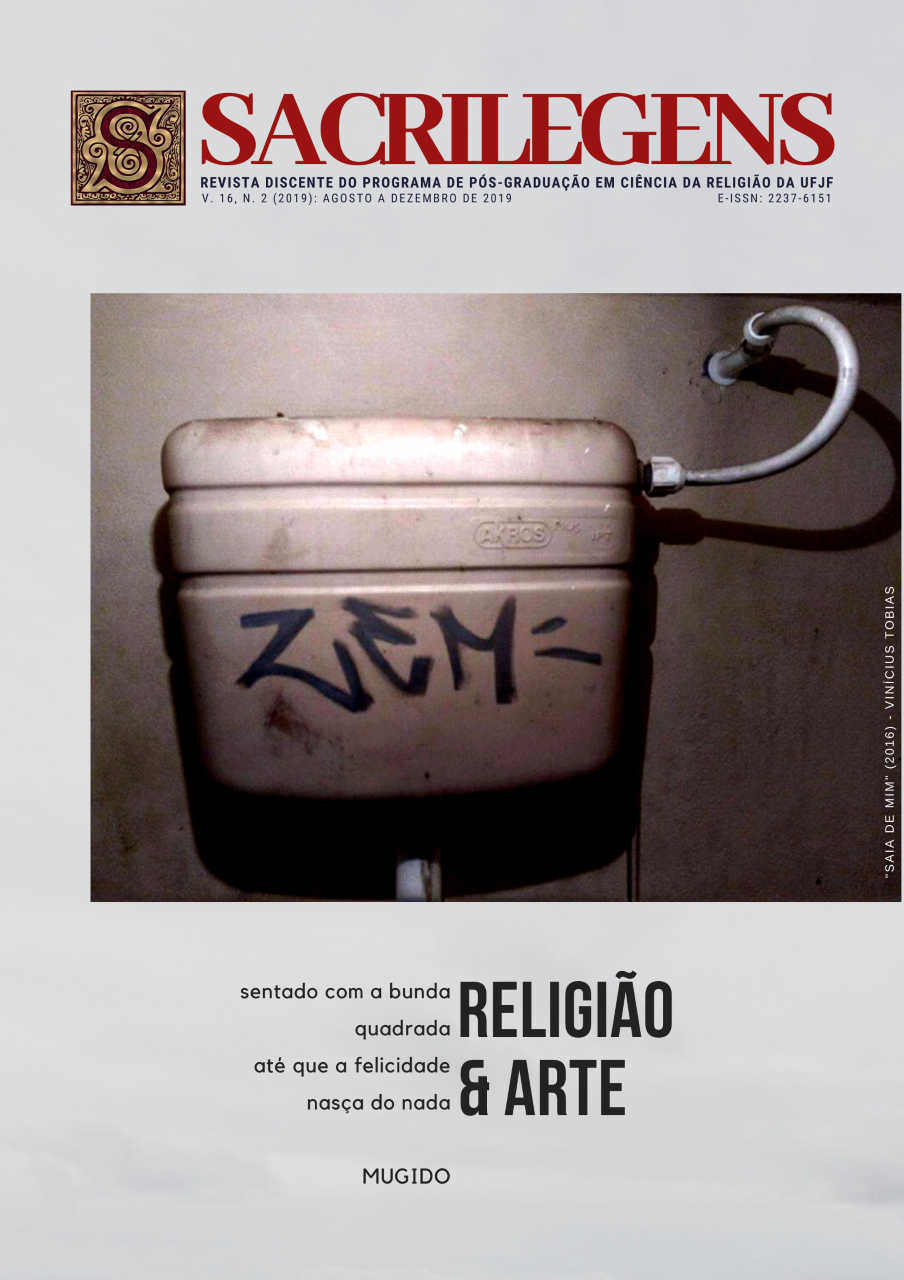The Silence of sound
vanguard music and Zen-buddhism
DOI:
https://doi.org/10.34019/2237-6151.2019.v16.27925Keywords:
John Cage, zen budismo, vanguarda, silêncio, história da arteAbstract
This article seeks to interpret the usance given to the transcendental experience of Zen Buddhism, the satori, in the context of the vanguard music of american composer John Cage. It is possible to say that one of the great themes and researches of his work, and his life, is the silence. By creating a space of hearing open to spontaneity, whereby it allows the "hearing" of silence, Cage redefined new ways and forms to deal with the organisation of sound material, by structuring it from randomness. For Cage, Zen will function as theoretical justification capable of evoking the Otherness of society, to be integrated in his compositional method - a method that tensions the frontiers between art and vital praxis, and formulate a critic to the category of the "work of art", on behalf of what was the project of the historical vanguards.
Downloads
References
BOULEZ, Pierre. The Boulez-Cage correspondence. Cambridge: Cambridge University Press, 1993.
CAGE, John. A Year from Monday: New lectures and writings by John Cage. Hanover: Wesleyan University Press, 1967.
__________. Composition in retrospect. Cambridge: Exact Change, 1993.
__________. Empty Words: Writings ’73-’78. Hanover: Wesleyan University Press, 1979.
__________. M: Writings ’67-‘72. Hanover: Wesleyan University Press, 1973.
__________. Silence: Lectures and writings by John Cage. Middletown: Wesleyan University Press, 1961.
__________. X: Writings ’79-’82. Middletown: Wesleyan University Press, 1983.
__________. For the birds: John Cage in conversation with Daniel Charles. Boston: M. Boyars, 1995.
KOSTELANETZ, Richard. Conversing with Cage. 3. ed. New York: Limelight, 1991.
Discografia
CAGE, John. Complete Piano Music, V. 1-10: com Steffen Schleiermacher. Alemanha: MDG, 2004. CD.
Artigos
BIAZOLI, Isis. O silêncio em Webern: uma escuta do Op. 30 a partir das concepções de silêncio de Cage e Boulez. Revista Música: São Paulo, v.13, nº1, p. 96-135, ago. 2012.
DURÃO, Fábio Akcelrud. Duas formas de se ouvir o silêncio: revisitando 4’33. Kriterion: Belo Horizonte, nº 112, dez. 2005, p. 429-441.
Dissertações e Teses
HELLER, Alberto Andrés. John Cage e a poética do silêncio. Tese (Doutorado em Teoria Literária). Florianópolis: UFSC, 2008.
DAS NEVES, Marcus Vinícius Marvila. Entre campos: a música de invenção na poética de Augusto de Campos. Dissertação (Mestrado em Letras). Vitória: UFES, 2010.
Livros
ADDLINGTON, Robert (org.). Sound commitments: Avant-garde Music and the Sixties. Nova York: Oxford University Press, 2009.
ADORNO, Theodor W. Dialética negativa. Rio de Janeiro: Jorge Zahar, 2009.
___________________. Filosofia da nova música. 2. ed. São Paulo: Perspectiva, 1989.
___________________. Introdução à sociologia da música. São Paulo: Editora Unesp, 2009.
___________________. Teoria estética. Lisboa: 70, 1993.
BÜRGER, Peter. Teoria da vanguarda. São Paulo: Cosac & Naify, 2008.
COHEN, Renato. Performance como linguagem: criação de um tempo-espaço de experimentação. 3. ed. São Paulo: Perspectiva, 2011.
COOMARASWAMY, Ananda Kendish. The transformation of nature in art. New York: Dover, c1934.
ECO, Umberto. Obra aberta: forma e indeterminação nas poéticas contemporâneas. 2.ed. São Pauo: Editora Perspectiva, 1971.
MAERHOFER, John W. Rethinking the vanguard: aesthetic and political positions in the modernist debate, 1917-1962. UK: Cambridge, 2009.
MARCUSE, Herbert. A dimensão estética. Lisboa: Edições 70, 2011.
NICHOLLS, David (org.). The Cambridge companion to John Cage. Cambridge: Cambridge University Press, 2002.
PADDISON, Max; DELIÉGE, Irene (org.). Contemporary music: theoretical and philosophical perspectives. USA: Ashgate, 2010.
PERLOFF, Marjorie. John Cage: composed in America. Chicago: University of Chicago Press, 1994.
________________. The poetics of indeterminacy: Rimbaud to Cage. Evanston, Ill: Northwestern University Press, 1999.
PRITCHETT, James. The Music of John Cage. Cambridge: Cambridge University Press, 1993.
SCHAFER, R. Murray. A afinação do mundo: uma exploração pioneira pela história passada e pelo atual estado do mais negligenciado aspecto do nosso ambiente: a paisagem sonora. 2.ed. São Paulo: Editora Unesp, 2011.
SONTAG, Susan. A vontade radical: estilos. São Paulo: Companhia das Letras, 1987.
STEINER, George. Linguagem e silêncio: ensaios sobre a crise da palavra. São Paulo: Companhia das Letras, 1998.
SUZUKI, Daisetz Teitaro. Introdução ao Zen-Budismo. São Paulo: Pensamento, 1989.
____________________. Mística: cristã e budista. Belo Horizonte: Itatiaia, 1976.
____________________. Viver através do Zen. Rio de Janeiro: Zahar, 1997.
____________________. Zen and japanese culture. New York: Princeton University Press, 2010.
TERRA, Vera. Acaso e aleatório na música: um estudo da indeterminação nas poéticas de Cage e Boulez. São Paulo: EDUC, 2000.
USARSKI, Frank. O Budismo e as outras: encontros e desencontros entre as grandes religiões mundiais. São Paulo: Ideias & Letras, 2017.
WATTS, Alan W. O budismo Zen. 5. ed. Lisboa: Presença, 2000.
WILHELM, Richard. I Ching: o livro das mutações. 27. ed. São Paulo: Pensamento, 2011.
WISNIK, José Miguel. O som e o sentido: uma outra história das músicas. 2.ed. São Paulo: Companhia das Letras, 2011.
Downloads
Published
How to Cite
Issue
Section
License
 Sacrilegens is licensed under a Creative Commons Attribution 4.0 International License.
Sacrilegens is licensed under a Creative Commons Attribution 4.0 International License.










